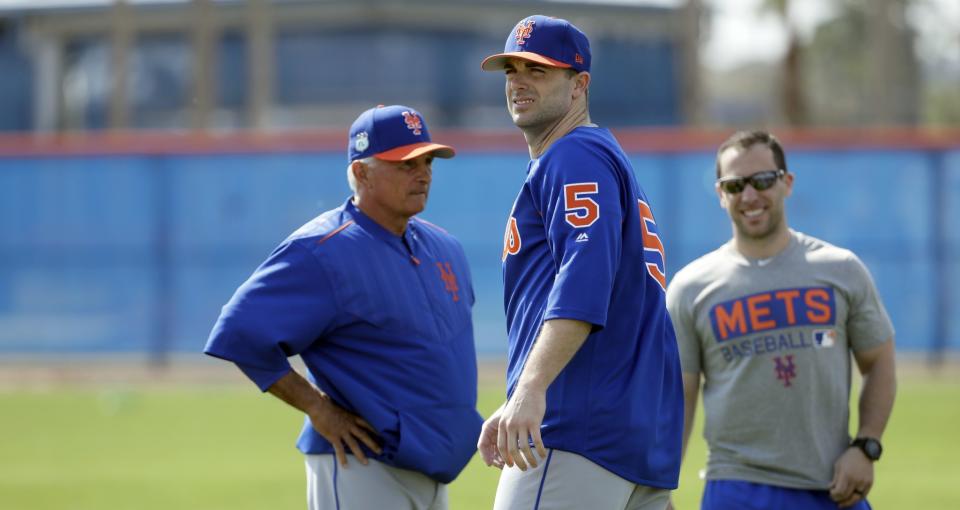Mets optimistic better days are ahead for David Wright

PORT ST. LUCIE, Fla. – Terry Collins stood Sunday morning with his arms crossed watching David Wright. They were on a half-field out back. Wright was fielding grounders shot from a fungo bat. He’d gather a two- or three-hopper, underhand it 10 feet to a guy squatting beside a bucket and return to his place a few strides from third base.
With every rep, Collins would take a step or two closer to Wright. After a time that brought Collins to Wright’s side. They spoke for a while. Wright nodded and Collins laid his hand on Wright’s shoulder and together they walked from the field, Wright carrying his glove by its thumb, his cap pushed back on his forehead, Collins talking out of the side of his mouth like managers sometimes do.
On the day the player, his manager and the general manager affirmed Wright and his back and his shoulder could be – and maybe even should be – together enough to be in the lineup by opening day, it was the short, thick and tan Collins in the thick of the process.
The process of Wright, at 34 years old, squeezing a few more innings, a few more at-bats out of a body that at times seems to have had it. The process of pushing a roster of veterans – among them a half-dozen or more outfielders, clumsily enough – toward a sensible resolution. The process of laying one starting pitcher after another, five or six or seven of them in a row, maybe, in the best of New York Mets worlds, Zack Wheeler after Steven Matz after Matt Harvey after Jacob deGrom after Noah Syndergaard, 25 or 30 times each.
On the day of their first full-squad practice, Collins, 67 years old and having overstayed the early estimates by at least three or four seasons, grew frustrated by a couple long lulls, men going this way and that but not fully engaged due to scheduling lags, but was otherwise thrilled at what played out before him. He put that hand on Wright’s shoulder, a tender gesture meant perhaps to reassure his captain that some days would be better than others, that this was a good one and more good ones were coming, that patience would serve them all.
“A great day,” he said about Wright, “all the way around.”

Collins has managed many teams, the majority of those in this same uniform. The Mets have grown up with him in his office chair, with him on the top step. The man tasked to get them through a clunky rebuild – a remodel at the very least – only while the stakes were low is now coming up on 1,000 games in the job, from a place where no one expected anything but calamity to this – a payroll in the $150 million range (nearly double what it was a few years ago), a roster stuffed with high-end veterans, a pitching staff laden with young and powerful and fragile arms, and the expectation to win and win again.
You perhaps got to know him better during the World Series run in 2015, and came to understand that even middle-aged men can grow up, can reinvent themselves, can discover the best in themselves.
Late last August, on an ordinary day at Citi Field, the Philadelphia Phillies were in town. A couple days before the Phillies had traded their catcher, Carlos Ruiz, to the Los Angeles Dodgers. In return they’d received a one-month rental, that being catcher A.J. Ellis. Collins was in the outfield during early batting practice early that afternoon. He spotted Ellis, in his Phillies uniform for the first time, lugging his gear toward the bullpen, where he’d catch a couple new teammates between starts. Collins and Ellis knew each other from years before, when Ellis was passing through the Dodgers’ system and Collins was its farm director. The trade had wounded Ellis. He was a Dodger lifer who’d risen to become a clubhouse leader, much more than simply Clayton Kershaw’s preferred catcher, and in a single phone call had lost the identity of being a Dodger, the promise of the postseason, and the notion that loyalty would always be repaid with loyalty.
Collins waved. Ellis waved back. And soon Collins was trotting toward Ellis. The conversation was brief.
“Do you know why you were traded?” Collins asked.
“Well, um, I guess …,” Ellis began.
“Let me tell you,” Collins answered. “You were traded because one day when you are sitting where I sit, managing your own team, and you have to give a kid the worst news of his career, what he thinks will be the worst news of his life, you’ll know what it feels like. You’ll know what it’s like to get that news.”
Life, man. Empathy. In a moment when a wobbled soul needed something to make it right, to give it value, Collins went out of his way to deliver context. Perspective.
Ellis nodded. Maybe, he thought.
So six months later it was impossible to watch Collins satisfy his own restless spirit by pacing and chatting and peeling away from the batting cage to watch this drill or take part in that conversation without also thinking about this team and his place in it. It’s New York, man. It’s the Mets. There will be moments that will feel calamitous, but won’t be, and there will be others that look insignificant … and won’t be. And that’s when you’ll remember why he makes sense at this time for this team in this city, and that time he put his hand on David Wright’s shoulder to say, perhaps, we’ll get there. Trust it. We’ll get there. And it’ll have been worth it.


